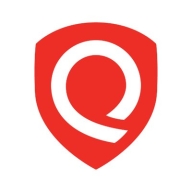

Qualys Web Application Scanning and Check Point CloudGuard WAF compete in the web application security category. Check Point CloudGuard WAF holds the upper hand with its comprehensive features, though Qualys is preferred for pricing and ease of deployment.
Features: Qualys Web Application Scanning offers robust vulnerability detection, effective scanning capabilities, and a solid security framework. Check Point CloudGuard WAF provides advanced threat prevention, real-time visibility, and extensive monitoring and response features.
Room for Improvement: Qualys could enhance its integration capabilities, customization options, and adaptability to specific environments. Check Point CloudGuard WAF users suggest improving system stability, user experience, and ease of use.
Ease of Deployment and Customer Service: Qualys Web Application Scanning offers a straightforward deployment process with a focus on simplicity. Check Point CloudGuard WAF has a more complex setup but delivers superior customer service, which helps mitigate deployment complexities.
Pricing and ROI: Qualys Web Application Scanning is considered cost-effective, making it a favorable option for budget-conscious buyers. Check Point CloudGuard WAF, while more expensive, offers a strong return on investment due to its advanced feature set.
When we are attacked, we can understand how important the solution is.
When you migrate to the cloud, it feels like saving 90% of your time.
Most of the operations happen in the background, so I do not spend much time on it.
They need to increase the number of people for 24/7 support.
They were responsive even before we committed to buying their solution.
I also received full technical support, especially during the implementation.
They have various options in the vulnerability management process, and when we initially bought our license, we didn't realize we needed PCI for better results, which isn't included in the default configurations.
Once we purchase the license, we have access to top-notch support.
I have dealt with Qualys's technical support, and any enhancements are challenging.
If I need to scale, I open a Whatsapp group with the director and the team, and we quickly proceed to do so.
They have sufficient resources, and there are no challenges from a scalability perspective.
Check Point CloudGuard WAF's scalability is very good.
My concern remains the lack of deep dive analysis and that it produces similar vulnerability results as other tools such as Nessus based on version checks instead of real impact checks.
It is licensed for assets, so we just contact the team for additional licenses if needed.
At one point, there was a limitation on reporting for 100,000 assets at a time.
It is very stable.
It is very stable, never crashing or giving me an error that I can see.
I did not have any issues in the last three years during which I had more than ten critical services running on CloudGuard.
The provider could improve by providing better guidance and support during the configuration process.
Future releases should include better bot mitigation, behavioral anomaly detection, compliance templates, advanced threat intel integration, and streamlined multi-cloud support to boost protection and usability.
A machine learning-based adaptive mode could help the WAF learn over time and auto-tune policies.
With the growing reliance on AI, Qualys Web Application Scanning should be updated to handle AI-based applications and LLM-based attacks.
Qualys Web Application Scanning does IP-level testing, requiring direct input of credentials, and can only scan a few pages to provide known generic vulnerabilities.
I would like it to be cheaper because it is a bit expensive compared to competitors like Tenable Nessus.
It is more expensive than f5, where we purchased everything as bundles, and Check Point costs more, but it is worth the money.
It is less costly than Cloudflare, Fortinet, and other vendors.
I know that its price is relatively expensive compared to other products but it gives benefits that are worth it.
They offer discounts on bulk licenses, making it cheaper compared to competitors like Veracode DAST.
I find it a bit expensive compared to other competitors.
Regarding pricing, I think for personal use, it is costly, but if organizations are ready to pay, then it is fine as they are using it.
Upon implementation and evaluation with third-party penetration testing, it meets rigorous security standards required for dealing with financial institutions.
It can protect against zero-day attacks and hidden anomalies.
The solution preemptively blocks zero-day attacks and detects hidden anomalies effectively.
It effectively detects vulnerabilities like the OWASP Top 10 without any issues in reporting.
Credential scanning is very effective because it goes in-depth into the system, crawling the pages, and reporting on vulnerabilities.
Qualys Web Application Scanning is accurate and provides minimal false positives.
| Product | Market Share (%) |
|---|---|
| Check Point CloudGuard WAF | 0.5% |
| Qualys Web Application Scanning | 1.8% |
| Other | 97.7% |

| Company Size | Count |
|---|---|
| Small Business | 32 |
| Midsize Enterprise | 19 |
| Large Enterprise | 16 |
| Company Size | Count |
|---|---|
| Small Business | 8 |
| Midsize Enterprise | 6 |
| Large Enterprise | 27 |
Check Point CloudGuard WAF offers advanced security for web applications and APIs with features such as intrusion prevention, bot prevention, and AI-driven threat detection, ensuring organizations achieve high-level protection and efficient security management.
Check Point CloudGuard WAF integrates with APIs, providing a seamless security enhancement while reducing false positives. Its scalability supports rapid deployment, valuable for companies aiming to secure resources in clouds like AWS and Azure. Enhanced threat prevention, comprehensive compliance support, and advanced threat protection methods such as SQL injection and cross-site scripting prevention are key strengths. Despite its robust capabilities, there are opportunities for improvement, such as lower costs, improved third-party tool integration, and a more intuitive interface to enhance usability.
What are the key features of Check Point CloudGuard WAF?Check Point CloudGuard WAF is predominantly applied within industries requiring stringent security standards, such as financial services, healthcare, and e-commerce. Its deployment strengthens the defense of critical APIs, facilitates compliance, and supports efficient multi-cloud security management, aligning well with evolving industry demands.
Qualys Web Application Scanning (WAS) is a fully cloud-based web application security scanner. The scanner will automatically crawl periodically and test web applications to discover potential vulnerabilities, including cross-site scripting (XSS) and SQL injection. The consistent testing equips the automated service to generate consistent results, lessen false positives, and offer the ability to scale to protect thousands of websites effortlessly.
Qualys Web Application Scanning is bundled with different scanning technology to carefully scan websites for malware infections and will send notifications to website owners to assist in preventing blacklisting and brand reputation damage. As digital transformation takes place in various organizations, Qualys WAS gives organizations the ability to track and document their web app security status through its interactive reporting capabilities.
Qualys WAS empowers organizations to remediate any web application vulnerabilities quickly. Some of the key tools offered are:
Benefits of Qualys Web Application Scanning
Qualys Web Application Scanning offers many benefits, including:
Reviews from Real Users
Qualys Web Application Scanning stands out among its competitors for a variety of reasons. Two of those reasons are its progressive scan and quick detection of vulnerabilities.
P.K., a senior software developer at a tech vendor, writes, "The feature that I have found most valuable is the progressive scan. It is good. It's done in 24 hours."
Nagaraj S., lead cybersecurity engineer at a tech service company, notes, "I have found the detection of vulnerabilities tool thorough with good results and the graphical display output to be wonderful and full of colors. It allows many types of outputs, such as bar and chart previews."
We monitor all Application Security Tools reviews to prevent fraudulent reviews and keep review quality high. We do not post reviews by company employees or direct competitors. We validate each review for authenticity via cross-reference with LinkedIn, and personal follow-up with the reviewer when necessary.